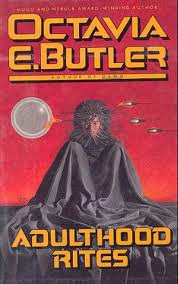Second in the Xenogenesis trilogy, this book is just as good as its predecessor and whets the appetite for the third, Imago, with ease.
Butler's deceptively simple style and short chapters make the characters relatable and the action continuous, even as the story spans many years.
This book, as well as the first, Dawn, sidles up to the idea of what it is to be human, how identity is created, and what (if any) ethical obligations exist in the face of pure biology.
I also found that reading it and identifying with characters with such broad perspectives has affected my own attitude in dealing with others and making decisions on a daily basis.
For one thing, patience is a highly prized characteristic of the "noble" characters in the book. It is also what the feared alien race is known for emulating to an almost ridiculous degree. It is often impatience that drives the human characters to exhibit the worst of their species - frustration, insecurity, aggression, paranoia. All these traits arise when humans are unable to take the time to merely listen: not something that requires decades of dedication. It is their unwillingness to listen to or put trust in not only the aliens, but others of their own species, that lead them to display the exact behavior which has convinced the aliens that humanity is incapable of survival without "genetic trade."
The brilliance of Butler's writing is multifold, but I am most particularly impressed with how ironically humanized the alien characters and psychology are as this story unfolds.
At the start of Dawn, identifying with the protagonist Lilith was simple and smooth. Butler rolls out information about the Oankali to the reader at the same speed Lilith receives it, and as a reader I found myself going through similar anxieties and doubts.
By the middle of Adulthood Rites, what could be called the "superiority" of the Oankali is difficult to dispute in many ways. Although unmoved by emotional displays and slow to make decisions, they do ultimately choose to do the "right" thing by human standards, at least to the degree that the situation allows. Humanity, meanwhile, continues to splinter and argue rather than accept their situation or make due with a compromise.
This was also a theme I picked up on in Butler's phenomenal novel, Kindred. Acceptance of an unfair and brutal reality. Patience in the face of dangerous opposition as unstoppable as a force of nature, but embodied in human form.
It is impressive that a story with such a preposterous premise is able to carry within it serious doubts and relevant assertions regarding the value of our very own species. Although the Oankali offer their trade to humanity on a genetic and cellular level (curing disease, improving memory, and the like), it is worth considering what other qualities they display that we are capable of learning within the genetic structure we already have.
It is disheartening to think how realistic it might be that extraterrestrial interbreeding may be the only thing that is capable of saving humanity from destroying itself. And yet, using borderline cartoonish alien creatures as facilitators, Butler brings this possibility into palpable consideration while at the same time displaying the respect and empathy for the undefinable humanity that each of us inexplicably carries on a level that transcends genetics.
Friday, January 3, 2014
Subscribe to:
Comments (Atom)


